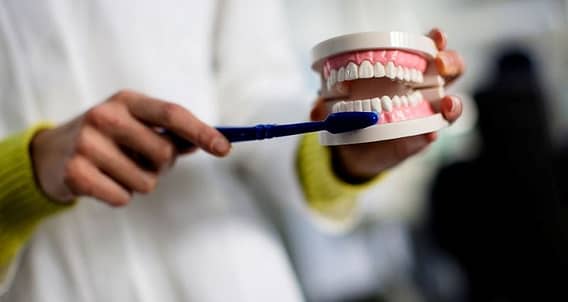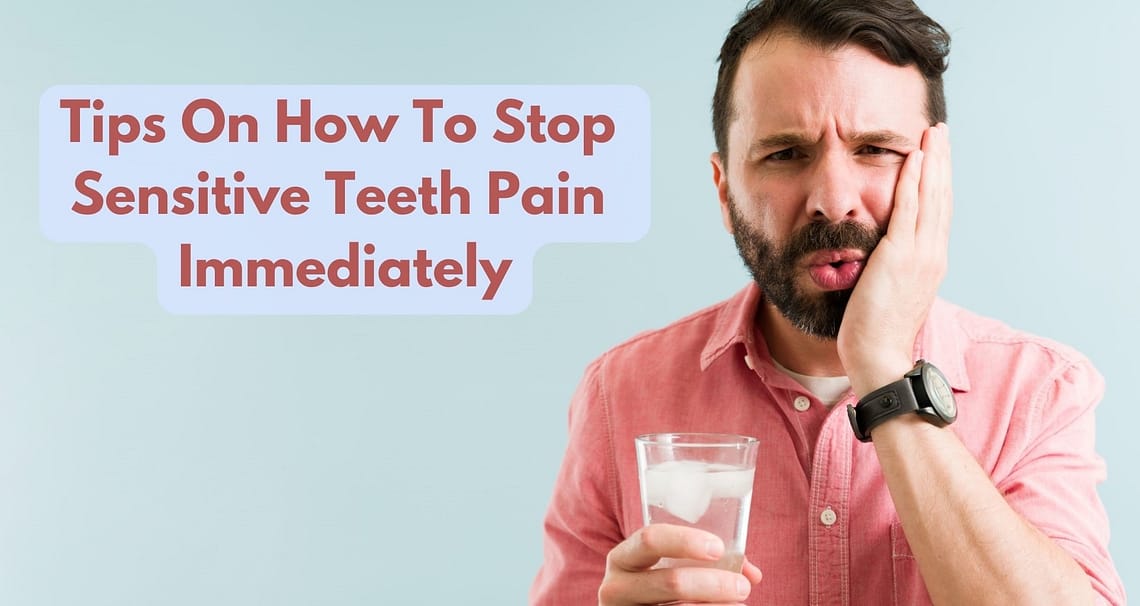Are you tired of experiencing painful sensitivity every time you take a bite of something cold or hot? Look no further, as this article provides you with essential tips on how to stop sensitive teeth pain immediately.
We understand how uncomfortable and inconvenient it can be to deal with sensitive teeth, but fear not! With these simple yet effective techniques, you’ll be able to enjoy all your favorite foods and drinks without any discomfort. So, get ready to say goodbye to sensitive teeth pain and hello to a pain-free smile!
Understanding Sensitive Teeth
What Causes Tooth Sensitivity?
Tooth sensitivity occurs when the protective layer of your teeth, called enamel, wears down. This can expose the underlying layer, called dentin, which contains tiny channels leading to the nerve of the tooth. When these channels are exposed, external stimuli such as hot or cold foods and drinks, sugary or acidic foods, and even cold air can trigger pain or discomfort.
How Does Tooth Sensitivity Pain Feel?
Tooth sensitivity pain can vary from person to person, but it commonly presents as a sharp, sudden, or shooting pain when you consume something hot, cold, sweet, or acidic. The pain can also be triggered by brushing or flossing your teeth, as well as by breathing in cold air. The intensity of the pain can range from mild to severe, depending on the extent of enamel loss and dentin exposure.
Also Check: What Cause Bad Breath Even After Brushing
Immediate Remedies for Sensitive Teeth
Use Desensitizing Toothpaste
Desensitizing toothpaste is specifically formulated to help reduce tooth sensitivity. These toothpastes contain compounds that block the transmission of pain signals from the tooth’s nerve to the brain. Brushing your teeth with a desensitizing toothpaste regularly can help alleviate sensitivity over time.
Apply Fluoride Gel or Rinse
Fluoride is known for its ability to strengthen tooth enamel and reduce sensitivity. Using a fluoride gel or rinse can help remineralize the enamel, making your teeth more resistant to pain. Apply the fluoride gel or rinse as directed by your dentist to reap its benefits.
Try a Toothpaste for Sensitivity Relief
In addition to desensitizing toothpaste, there are toothpaste options specifically designed to provide relief from tooth sensitivity. These toothpastes typically contain ingredients that block the channels leading to the tooth’s nerve or help repair and strengthen the enamel.

Use a Soft-bristled Toothbrush
Using a soft-bristled toothbrush is crucial for individuals with sensitive teeth. Hard-bristled brushes can exacerbate sensitivity and cause further damage to the enamel. Be gentle when brushing your teeth, using short, gentle strokes.
Be Gentle with Brushing and Flossing
Aside from using a soft-bristled toothbrush, it’s important to be gentle when brushing and flossing your teeth. Aggressive brushing and flossing can lead to enamel erosion and gum recession, which can contribute to tooth sensitivity. Take your time and use a gentle touch to protect your teeth and gums.
Avoid Acidic Foods and Drinks
Acidic foods and drinks can erode enamel and worsen tooth sensitivity. Limit your consumption of citrus fruits, sodas, sports drinks, and other acidic beverages. If you do consume them, rinse your mouth with water afterward to help neutralize the acids.
Limit Tooth Whitening Products
While many people desire a brighter smile, excessive use of tooth whitening products can contribute to tooth sensitivity. Overusing whitening strips, gels, or trays can lead to enamel erosion, causing sensitivity. Follow the instructions on whitening products and consult with your dentist for the best approach.
Stop Grinding Your Teeth
Grinding or clenching your teeth can wear down enamel and expose dentin, leading to tooth sensitivity. If you suspect you grind your teeth, especially at night, consider using a mouthguard to protect your teeth. A customized mouthguard from your dentist can provide the best fit and protection.
Use a Mouthguard at Night
If you grind your teeth at night, using a mouthguard can help alleviate tooth sensitivity. This protective device serves as a cushion and prevents your teeth from grinding against each other, reducing the risk of enamel wear and dentin exposure.
Consider a Dental Cleaning
Sometimes, dental plaque and tartar buildup can contribute to tooth sensitivity. A professional dental cleaning can remove these deposits, improving overall oral health and reducing sensitivity. Consult with your dentist to determine the appropriate timing and frequency for dental cleanings.

Long-term Solutions for Sensitive Teeth
Practice Good Oral Hygiene
Maintaining excellent oral hygiene is crucial for preventing and managing tooth sensitivity. Brush your teeth at least twice a day with a soft-bristled toothbrush, use fluoride toothpaste, and floss daily to remove plaque and bacteria. This will help keep your teeth and gums healthy and reduce sensitivity.
Use a Toothpaste for Sensitive Teeth
Continuing to use a toothpaste specifically formulated for sensitive teeth can be a long-term solution for managing sensitivity. These toothpastes help block nerve signals, strengthen enamel, and protect against further damage. Consult with your dentist to find the most suitable toothpaste for your needs.
Try a Protective Dental Coating
In some cases, your dentist may recommend applying a protective dental coating, such as a bonding agent or dental sealant, to the exposed areas of your teeth. These coatings act as a barrier, protecting the dentin and reducing sensitivity.
Get a Dental Restoration
If tooth sensitivity is caused by tooth decay, cracked or broken teeth, or worn-out fillings, your dentist may recommend a dental restoration. This can involve filling cavities, repairing cracked teeth, or replacing worn-out fillings to alleviate sensitivity and restore proper function.
Use Fluoride Treatment
Your dentist may suggest in-office fluoride treatment to strengthen your tooth enamel and reduce sensitivity. This involves applying a highly concentrated fluoride gel or varnish directly to your teeth, providing a potent dose of remineralization to the enamel.
Manage Acid Reflux
Acid reflux can contribute to tooth sensitivity by exposing the teeth to stomach acid. If you experience frequent acid reflux, speak with your healthcare provider about managing this condition to reduce its impact on your oral health.
Adjust Your Bite
An irregular or misaligned bite can cause uneven force distribution on your teeth, leading to sensitivity in certain areas. Your dentist may recommend orthodontic treatment or the use of dental appliances to adjust your bite and alleviate sensitivity.
Undergo Root Canal Treatment
For severe cases of tooth sensitivity caused by infection or nerve damage, your dentist may recommend root canal treatment. This involves removing the infected or damaged nerve tissue from the tooth and sealing it to prevent further discomfort.
Consider Gum Grafting
Receding gums can expose the sensitive roots of your teeth, leading to tooth sensitivity. In more severe cases, your dentist may suggest gum grafting, where gum tissue is taken from another part of your mouth and transplanted to the affected area to cover the exposed roots.
Follow-up with Regular Dental Check-ups
Regular dental check-ups are essential for monitoring and managing tooth sensitivity. Your dentist can assess the progress, provide personalized advice, and make recommendations for further treatment if necessary. Make it a habit to schedule dental visits every six months or as recommended by your dentist.
This image is property of pixabay.com.
Frequently Asked Questions (FAQs)
What other causes can lead to tooth sensitivity?
Aside from enamel erosion, tooth sensitivity can be caused by gum recession, cracked teeth, tooth decay, worn-out fillings, or teeth grinding. Dental procedures such as teeth whitening, dental cleanings, and root canal treatment can also sometimes trigger temporary sensitivity.
Can sensitive teeth be a sign of a more serious dental problem?
While tooth sensitivity is often a result of enamel erosion, it can be a symptom of an underlying dental issue. This can include tooth decay, gum disease, cracked teeth, or infected root canals. Consulting a dentist is crucial to determine the cause of your sensitivity and address any potential underlying problems.
Are there any home remedies to alleviate tooth sensitivity?
While there are home remedies that may provide temporary relief, such as rinsing with saltwater or applying a cold compress, it’s essential to consult with a dentist for a proper diagnosis and personalized advice. Home remedies may not address the underlying cause and could potentially worsen the condition.
Can tooth sensitivity go away on its own?
In some cases, tooth sensitivity can improve or dissipate on its own, especially if it is caused by temporary factors such as recent dental treatments. However, for chronic or persistent sensitivity, it’s best to consult a dentist for evaluation and appropriate treatment options.
When should I consult a dentist?
If you experience persistent or severe tooth sensitivity, it is recommended to consult a dentist. Additionally, if you notice sudden changes in tooth sensitivity or if sensitivity is accompanied by other dental symptoms, such as pain, swelling, or bleeding, it is important to seek professional dental care.
Conclusion
Tooth sensitivity can be a frustrating and uncomfortable condition, but taking immediate action and implementing long-term solutions can help alleviate the pain.
By using desensitizing toothpaste, practicing good oral hygiene, visiting your dentist regularly, and seeking appropriate treatment, you can manage tooth sensitivity and enjoy a healthy, pain-free smile.
Remember, consulting a dentist is crucial for proper diagnosis and personalized advice, so don’t hesitate to reach out for professional guidance.






